
Journal of Risk
Scope & Guideline
Innovating Perspectives on Risk and Strategy
Introduction
Aims and Scopes
- Quantitative Risk Assessment:
The journal focuses on quantitative methods for assessing various types of risks, including market risk, credit risk, and operational risk. This includes the development of statistical models and estimation techniques to measure and manage risk. - Market Dynamics and Financial Stability:
Research often addresses the interplay between market dynamics and systemic risk, exploring how different financial instruments and market conditions impact stability. This includes studies on volatility, liquidity, and the effects of macroeconomic factors. - Investment Strategies and Portfolio Management:
The journal publishes papers that analyze investment strategies, including the optimization of portfolios under various risk scenarios. This encompasses modern portfolio theory, behavioral finance, and the impact of investor sentiment on asset pricing. - Insurance and Risk Transfer:
A significant portion of the journal's publications focuses on risk transfer mechanisms, particularly in the insurance sector. This includes studies on reinsurance strategies, pricing models, and the implications of risk-sharing in financial markets. - Regulatory Frameworks and Risk Management Tools:
The journal engages with the implications of regulatory changes on risk management practices, offering critical assessments of tools such as anti-procyclicality measures and value-at-risk models.
Trending and Emerging
- Advanced Bayesian Estimation Techniques:
There is an increasing focus on Bayesian methods for risk estimation, particularly in portfolio management. This trend highlights the demand for more flexible and robust statistical frameworks that accommodate uncertainty and prior information. - Impact of Climate Change on Financial Risk:
Research examining the implications of climate change for credit and market risk is gaining traction. This emerging theme reflects the growing recognition of environmental factors as critical components of financial risk assessment. - High-Frequency Trading and Market Dynamics:
The analysis of high-frequency trading and its impact on market volatility and risk is becoming more prevalent. This trend underscores the importance of understanding rapid market movements and the associated risks in real-time trading environments. - Risk Management in Cryptocurrencies:
With the rise of cryptocurrencies, there is an emerging focus on assessing risks associated with digital assets. This includes studies on volatility, market behavior, and risk management strategies tailored to this relatively new asset class. - Integration of Machine Learning in Risk Assessment:
The application of machine learning techniques to enhance risk modeling and prediction is on the rise. This trend signifies a move towards leveraging advanced computational methods to improve the accuracy and efficiency of risk assessments.
Declining or Waning
- Traditional Risk Models:
There has been a noticeable reduction in publications focused solely on traditional risk modeling techniques, such as basic value-at-risk calculations without enhancements. This decline may indicate a shift towards more sophisticated, multi-faceted approaches to risk assessment. - General Economic Sentiment Analysis:
Papers that broadly analyze economic sentiment without specific contextual applications have decreased. This suggests a move towards more targeted studies that connect sentiment analysis directly to financial instruments or market events. - Static Risk Assessment Approaches:
Research focusing on static models that do not account for changing market conditions or dynamic systems has waned. The trend now favors dynamic models that incorporate time-varying parameters and real-time data.
Similar Journals

International Review of Finance
Innovating discourse in the realm of finance research.International Review of Finance is a prestigious academic journal published by Wiley, located in the United Kingdom. With its ISSN 1369-412X and E-ISSN 1468-2443, this journal serves as an essential platform for researchers and practitioners in the fields of Economics and Finance. Ranked in the Q2 quartile for both Economics and Econometrics and Finance as of 2023, it showcases high-quality research that contributes significantly to theoretical and practical advancements. Reflecting its standing, the journal is positioned in the 61st percentile in Economics and Econometrics and the 60th percentile in Finance according to Scopus rankings. The scope of the journal includes a diverse range of topics, encouraging innovative discourse across various financial disciplines. Although it does not offer open access, the International Review of Finance continues to be an important resource for academics, professionals, and students seeking to deepen their understanding of evolving financial theories and practices.
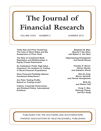
JOURNAL OF FINANCIAL RESEARCH
Empowering Researchers in Financial MethodologiesThe JOURNAL OF FINANCIAL RESEARCH, published by WILEY, stands as a pivotal platform for disseminating innovative research in the fields of finance and accounting since its inception in 1978. With an ISSN of 0270-2592 and an E-ISSN of 1475-6803, this journal aims to address contemporary challenges and trends within the financial research landscape. It has achieved notable recognition, being placed in the Q2 category for both Finance and Accounting in the 2023 rankings, signifying its relevance and impact within the academic community. Although it does not currently offer open access, the journal is accessible through various academic databases, catering to a diverse audience of researchers, professionals, and students keen on advancing their knowledge and understanding of financial systems and methodologies. With an evolving scope that encompasses empirical studies, theoretical frameworks, and practical applications, the JOURNAL OF FINANCIAL RESEARCH is committed to contributing valuable insights into the complexities of financial practices and policies.
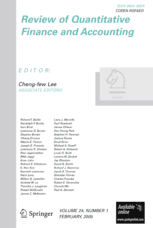
Review of Quantitative Finance and Accounting
Fostering Excellence in Financial Research and AnalysisThe Review of Quantitative Finance and Accounting, published by Springer, is a distinguished academic journal that has been at the forefront of scholarly discourse since its inception in 1991. With an ISSN of 0924-865X and an E-ISSN of 1573-7179, this journal specializes in the interdisciplinary realms of accounting and finance, particularly emphasizing quantitative methodologies and their applications in real-world scenarios. With an impressive track record reflected in its 2023 rankings, it sits in the Q2 category across key fields such as Accounting, Business Management, and Finance, demonstrating its relevance and influence within these domains. Although it operates without an Open Access option, the journal's content remains vital for researchers, professionals, and students aiming to deepen their understanding of quantitative approaches in finance and accounting contexts. The Review of Quantitative Finance and Accounting stands as an essential resource for advancing knowledge and fostering innovation within these critical disciplines.
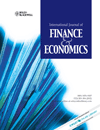
INTERNATIONAL JOURNAL OF FINANCE & ECONOMICS
Bridging Theory and Practice in FinanceInternational Journal of Finance & Economics, published by Wiley, is a premier academic journal that serves as a vital resource for researchers and professionals in the fields of finance, accounting, and economics. With an impressive impact factor and a reputation for excellence, the journal is recognized in the 2023 Scopus rankings, placing in the top quartiles across multiple categories, including Q2 in Accounting, Economics, and Finance. The journal has been a significant contributor to academic discourse since its inception in 1996, with its converged years extending to 2024, thereby ensuring the continuous advancement of knowledge in these critical areas. Although it operates under a traditional subscription model, its comprehensive articles provide insightful analyses, empirical research, and theoretical advancements that cater to a diverse audience—from seasoned scholars to emerging students in the field.
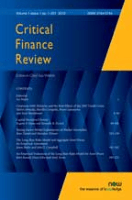
Critical Finance Review
Elevating financial research with innovative perspectives.Critical Finance Review is a premier academic journal dedicated to advancing the field of finance through the publication of high-quality research that spans various dimensions of the discipline. Published by NOW PUBLISHERS INC, this journal has quickly established itself as a leading source of innovative finance scholarship, achieving a notable Q1 classification in the 2023 finance category. Operating under a rigorous peer-review process, the journal ensures the academic integrity and relevance of its content, which attracts contributions from both emerging and established scholars. With an ISSN of 2164-5744 and E-ISSN 2164-5760, it is accessible to a global audience, though it operates under traditional access models. The journal welcomes a diverse range of topics including, but not limited to, risk management, financial markets, and quantitative finance, making it an essential resource for researchers, professionals, and students who are keen to explore the complexities of financial systems and develop new insights in the ever-evolving landscape of finance. Based in the United States, Critical Finance Review holds a significant position within the academic community, fostering a collaborative environment that encourages innovative thinking and practical applications of financial theories.

FINANCE AND STOCHASTICS
Bridging Finance and Statistics for Tomorrow's ChallengesFinance and Stochastics is a leading academic journal published by Springer Heidelberg, focusing on the intricate interplay of finance, probability, and statistics. With an impressive impact factor and ranked within the Q1 category in both finance and statistics, it serves as an essential resource for researchers and professionals seeking to advance their understanding of stochastic modeling in financial contexts. The journal has maintained a strong reputation since its inception, with contributions from renowned scholars worldwide. The editorial team prioritizes high-quality research that addresses contemporary challenges in financial mathematics and extends the boundaries of statistical methods. Nestled in the heart of Germany, Finance and Stochastics embraces a broad scope, inviting submissions that explore innovative approaches to economic theory and quantitative methodologies. This combination of rigorous academic standards and commitment to impactful research makes the journal a pivotal avenue for disseminating knowledge and fostering collaboration in the finance and statistics communities.

Journal of Computational Finance
Exploring the intersection of finance, mathematics, and technology.Journal of Computational Finance, published by INCISIVE MEDIA, stands at the forefront of interdisciplinary research, amalgamating the realms of finance, applied mathematics, and computer science. With its ISSN 1460-1559 and E-ISSN 1755-2850, this journal provides a vital platform for scholars and practitioners alike, aiming to advance methodologies and computational techniques that enhance financial decision-making processes. Although currently categorized in the Q3 quartile across various disciplines—including Applied Mathematics, Computer Science Applications, and Finance—its commitment to quality research is unwavering, as evidenced by its curated selection of innovative studies. The journal’s scope includes computational modeling, algorithmic trading, risk management, and quantitative finance solutions. Each volume seeks to not only foster academic discourse but also bridge theoretical findings with practical applications in the financial industry. Given its convergence from 2011 to 2024, the journal continues to evolve alongside the rapidly changing financial landscape, supporting researchers, students, and professionals in navigating the complexities of computational finance.
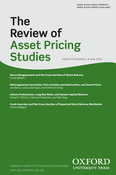
Review of Asset Pricing Studies
Leading the Charge in Economic and Financial ScholarshipThe Review of Asset Pricing Studies, published by Oxford University Press, stands as a leading journal in the fields of Economics and Finance, recognized for its rigorous analyses and innovative research since its inception in 2011. This esteemed publication maintains an impressive impact factor and ranks in the Q1 category for both Economics and Finance as of 2023, consistently occupying top positions in Scopus rankings across its relevant categories. With a clear focus on advancing knowledge in asset pricing and investment strategies, the journal serves as a vital platform for researchers, professionals, and students seeking to contribute to and stay informed on the latest developments in these dynamic fields. Despite its lack of open access, the journal ensures wide circulation and accessibility through its reputable publisher, thereby fostering an engaged academic community.

Probability Uncertainty and Quantitative Risk
Empowering Research in Applied Mathematics and StatisticsProbability Uncertainty and Quantitative Risk, published by the American Institute of Mathematical Sciences (AIMS), is a distinguished open-access journal that has been contributing to the academic community since its inception in 2016. With a focus on the crucial interplay between probability, uncertainty, and quantitative risk assessment, this journal serves as a vital platform for researchers, practitioners, and students engaged in the fields of Applied Mathematics and Statistics. The journal's ranking in the Q2 category for both Applied Mathematics and Statistics and Probability reflects its growing influence and relevance, while its diverse scope encourages interdisciplinary studies. As a part of the Scopus database and maintaining a consistent publication pace through 2024, Probability Uncertainty and Quantitative Risk is essential for anyone looking to remain at the forefront of research in risk analysis and uncertainty modeling. Its commitment to open access since 2016 further enhances accessibility to cutting-edge findings, making it an indispensable resource for academics and industry professionals alike.
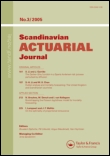
Scandinavian Actuarial Journal
Uncovering transformative insights in economics and statistics.The Scandinavian Actuarial Journal, published by Taylor & Francis Ltd, stands as a pivotal resource in the fields of Economics, Econometrics, Statistics, and Probability, with a legacy dating back to 1918. This esteemed journal, headquartered in the United Kingdom, offers valuable insights and comprehensive research findings that contribute significantly to the actuarial and statistical communities. With its impressive 2023 quartile rankings—Q1 in both Statistics and Probability, and in Statistics, Probability and Uncertainty, as well as Q2 in Economics and Econometrics—this journal is recognized for its high-quality peer-reviewed content, making it indispensable for researchers, professionals, and students alike. Although it currently does not operate under an Open Access model, the journal ensures rigorous academic standards and broad visibility within its field. With a Scopus rank placing it in the top quartile of relevant categories, the Scandinavian Actuarial Journal is committed to advancing knowledge and fostering innovation in statistical methodologies and insights.